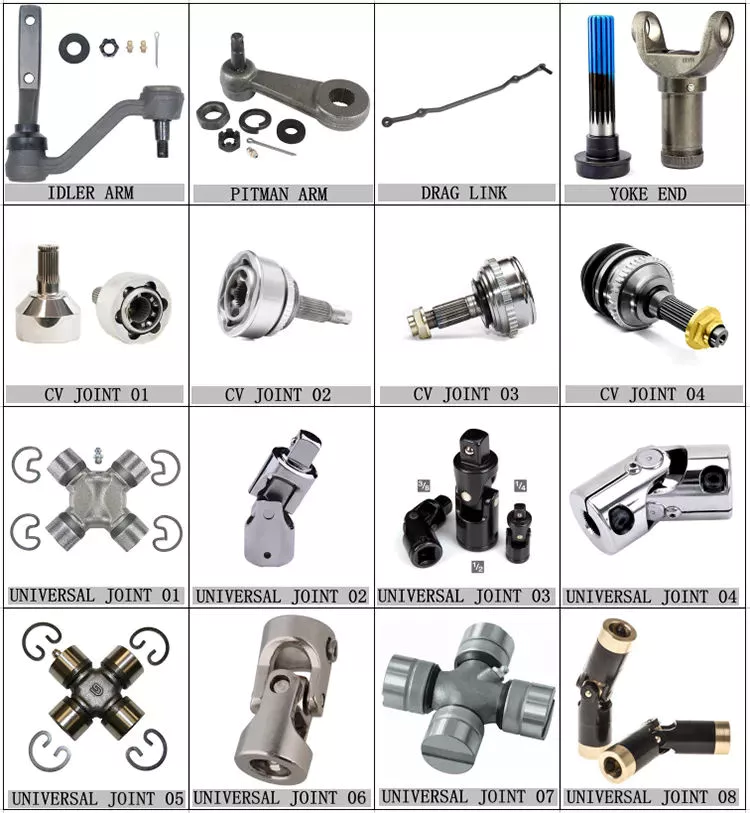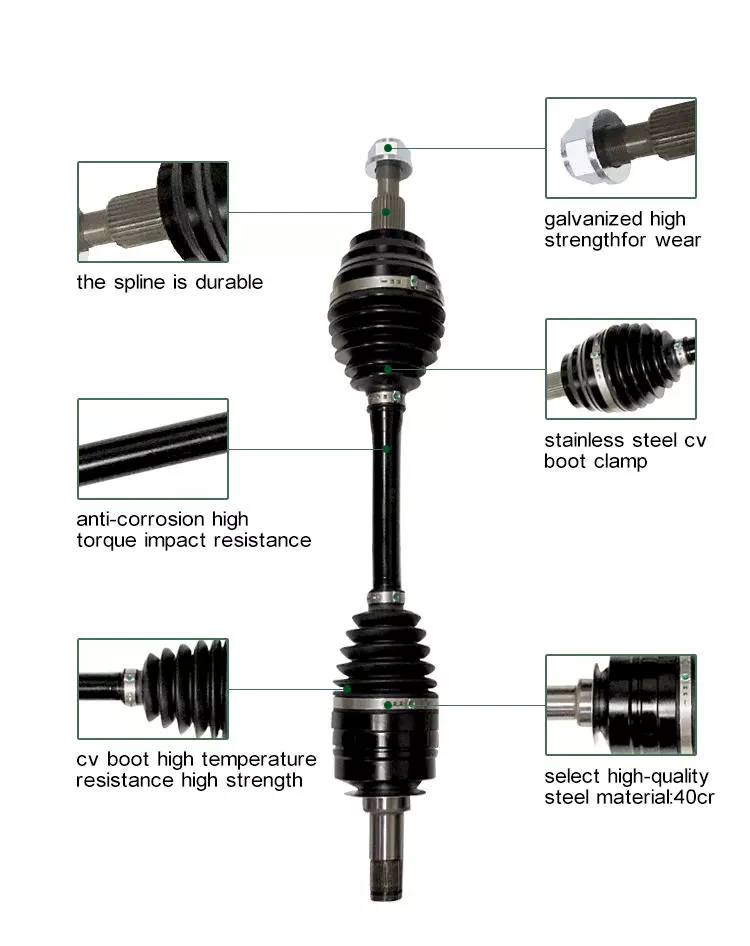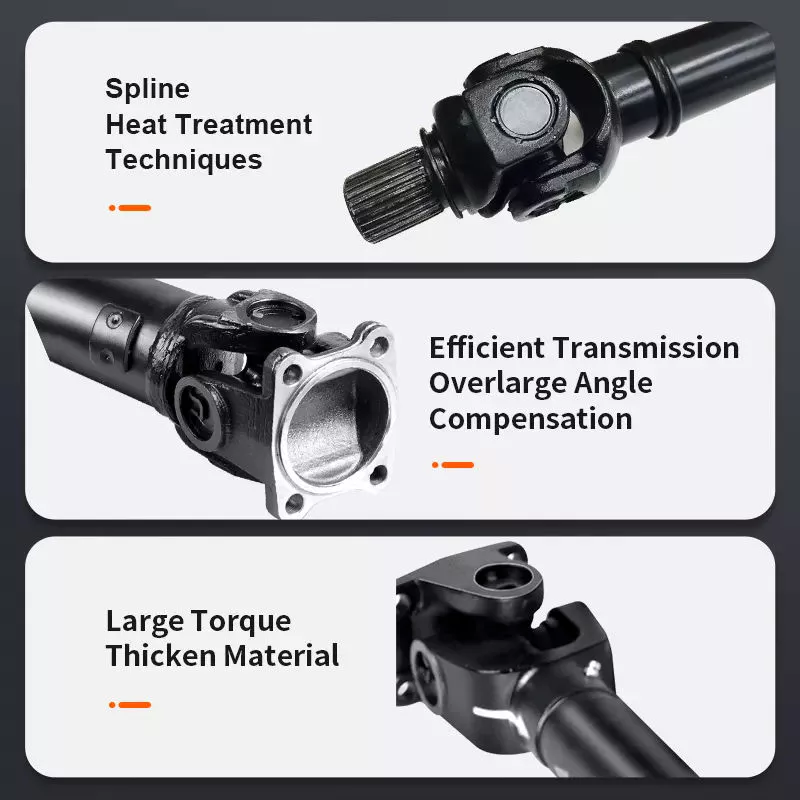Product Description
Customized High Precision Spare Parts Auto/Truck/Drive/Gear/Spline/Propeller/Half/Sleeve/Machinery/Sliding/Transmission Axle Shaft 42CrMo 20CrMoTi
(1) Accessory products of the truck, the product quality is stable and reliable.
(2) Forged with 42CrMo material and heat treated and tempered for 32 degrees, so that the half shaft has stronger toughness and is not easy to break and bend.
(3) Processed in the machining center, ensure that the products have rigorous dimensional coordinates to ensure 100% qualified rate of products.
(4) Products are inspected 1 by 1 and delivered out of the warehouse, with unified laser identification to ensure product traceability.
(5) Various sizes of axle shafts can be customized to meet customer needs.
(6) The unified brand carton, inner bag and integral foam packaging, which is strong and beautiful.
Factory Show
More Products
| Truck Model | Sinotruk, Shacman, CZPT Auman, CZPT Xihu (West Lake) Dis., Xihu (West Lake) Dis.feng, Xihu (West Lake) Dis.feng Liuqi Balong, North BENZ( BEIBEN), C&C, JAC, etc. | |
| Product catalogue | Axle | Wheel Assembly |
| Differential Assembly | ||
| Main Reducer Assembly | ||
| Inner Ring Gear& Bracket | ||
| Basin Angle Gear/ Bevel Gear | ||
| Axle Shaft/ Half Shaft & Through Shaft | ||
| Axle Housing& Axle Assembly | ||
| Steering knuckle & Front Axle | ||
| Gear | ||
| Brake Drum& Wheel Hub | ||
| Flange | ||
| Bearing | ||
| Main Reducer Housing | ||
| Oil Seal Seat | ||
| Nut& Shim Series | ||
| Brake Backing Plate | ||
| Chassis Support Products | Leaf Spring Bracket | |
| Drop Arm Series | ||
| Bracket Series | ||
| Leaf Spring Shackle Series | ||
| Balanced Suspension Series | Balance Shaft Assembly | |
| Balance Shaft Housing | ||
| Axle Spring Seat | ||
| Thrust Rod | ||
| Balance Shaft Parts | ||
| Shock Absorber Series | Shock Absorber | |
| Shock Absorbing Airbag | ||
| Steering System | Power Steering Pump | |
| Power Steering Gear | ||
| Rubber Products | Oil Seal | |
| Rubber Support | ||
| Thrust Rod Rubber Core | ||
| Truck Belt | ||
| Engine support | ||
| Other | ||
| Clutch Series | Clutch Pressure Plate | |
| Clutch Disc | ||
| Flywheel Assembly | ||
| Flywheel Ring Gear | ||
| Adjusting Arm Series | ||
Function
Heavy trucks usually have double rear axles. If they are driven separately, they need to use 2 transmission shafts or add a transfer case at the output of the gearbox, which is heavy and cumbersome. Now a through shaft is designed in the middle axle to solve this problem. Only 1 transmission shaft is needed to drive 2 rear axles at the same time.
Packaging & Shipping
Exhibition
FAQ
Q1. Are you a factory or trading company?
We are a factory integrating research, development, production and sales.
Q2. What are the advantages of your products?
We support product customization to meet customer needs for special products. We can strictly control the products from raw materials to production, processing, product quality inspection, delivery, packaging, etc., and provide customers with high-end products and the most advantageous prices.
Q3. How about products price?
We are a factory, all products are direct sale at factory price. For the same price, we will provide the best quality; for the same quality, we have the most advantageous price.
Q4. What is your terms of packing?
We have branded packaging and neutral packaging, and we can also do what you want with authorization. This is flexible.
Q5. How to guarantee your after-sales service?
Strict inspection during production, Strictly check the products before shipment to ensure our packaging in good condition. Track and receive feedback from customer regularly. Our products warranty is 365 days.
Each product provides quality assurance service. If there is a problem with the product within the warranty period, the customer can negotiate with us in detail about the related claims, and we will do our best to satisfy the customer.
Certifications
/* January 22, 2571 19:08:37 */!function(){function s(e,r){var a,o={};try{e&&e.split(“,”).forEach(function(e,t){e&&(a=e.match(/(.*?):(.*)$/))&&1
| Material: | 45#Steel, 42CrMo, 20crmoti |
|---|---|
| Load: | Drive Shaft |
| Journal Diameter Dimensional Accuracy: | High Precision |
| Samples: |
US$ 29/Piece
1 Piece(Min.Order) | Order Sample |
|---|
| Customization: |
Available
| Customized Request |
|---|
.shipping-cost-tm .tm-status-off{background: none;padding:0;color: #1470cc}
| Shipping Cost:
Estimated freight per unit. |
about shipping cost and estimated delivery time. |
|---|
| Payment Method: |
|
|---|---|
|
Initial Payment Full Payment |
| Currency: | US$ |
|---|
| Return&refunds: | You can apply for a refund up to 30 days after receipt of the products. |
|---|

Can drivelines be adapted for use in both automotive and industrial settings?
Drivelines can indeed be adapted for use in both automotive and industrial settings. While there are some differences in the specific requirements and design considerations between these two applications, many fundamental principles and components of drivelines remain applicable to both sectors. Let’s explore how drivelines can be adapted for use in automotive and industrial settings:
1. Power Transmission:
In both automotive and industrial applications, drivelines serve the purpose of transmitting power from a source (such as an engine or motor) to various driven components. The driveline components, including transmissions, clutches, differentials, and shafts, can be adapted and optimized based on the specific power requirements and operating conditions of each application. While automotive drivelines typically focus on delivering power for propulsion, industrial drivelines may transmit power to various machinery and equipment.
2. Gearboxes and Transmissions:
Both automotive and industrial drivelines often incorporate gearboxes or transmissions to provide multiple gear ratios for efficient power transfer. However, the gear ratios and design considerations may differ based on the specific requirements of each application. Automotive drivelines are typically optimized for a wide range of operating conditions, including varying speeds and loads. Industrial drivelines, on the other hand, may be designed to meet specific torque and speed requirements of industrial machinery.
3. Shaft and Coupling Systems:
Shafts and coupling systems are essential components of drivelines in both automotive and industrial settings. They transmit power between different components and allow for misalignment compensation. While automotive drivelines often use driveshafts and universal joints to transmit power to the wheels, industrial drivelines may employ shafts, couplings, and flexible couplings to connect various machinery components such as motors, pumps, and generators.
4. Differentiated Requirements:
Automotive and industrial drivelines have different operating conditions, load requirements, and environmental considerations. Automotive drivelines need to accommodate various road conditions, vehicle dynamics, and driver comfort. Industrial drivelines, on the other hand, may operate in more controlled environments but are subjected to specific industry requirements, such as high torque, continuous operation, or exposure to harsh conditions. The driveline components and materials can be adapted accordingly to meet these different requirements.
5. Control and Monitoring Systems:
Both automotive and industrial drivelines can benefit from advanced control and monitoring systems. These systems can optimize power distribution, manage gear shifts, monitor component health, and improve overall driveline efficiency. In automotive applications, electronic control units (ECUs) play a significant role in controlling driveline functions, while industrial drivelines may incorporate programmable logic controllers (PLCs) or other specialized control systems.
6. Customization and Integration:
Drivelines can be customized and integrated into specific automotive and industrial applications. Automotive drivelines can be tailored to meet the requirements of different vehicle types, such as passenger cars, trucks, or sports vehicles. Industrial drivelines can be designed to integrate seamlessly with specific machinery and equipment, considering factors such as available space, power requirements, and maintenance accessibility.
7. Maintenance and Service:
While the specific maintenance requirements may vary, both automotive and industrial drivelines require regular inspection, lubrication, and component replacement to ensure optimal performance and longevity. Proper maintenance practices, as discussed earlier, are essential for prolonging the lifespan of driveline components in both settings.
In summary, drivelines can be adapted for use in both automotive and industrial settings by considering the unique requirements and operating conditions of each application. While there are some differences in design considerations and component selection, the fundamental principles of power transmission and driveline functionality remain applicable in both sectors.

Can you provide real-world examples of vehicles and machinery that use drivelines?
Drivelines are used in a wide range of vehicles and machinery across various industries. These driveline systems are responsible for transmitting power from the engine or motor to the wheels or driven components. Here are some real-world examples of vehicles and machinery that utilize drivelines:
1. Automobiles:
Drivelines are integral to automobiles, providing power transmission from the engine to the wheels. Various driveline configurations are used, including:
- Front-Wheel Drive (FWD): Many compact cars and passenger vehicles employ front-wheel drive, where the driveline powers the front wheels.
- Rear-Wheel Drive (RWD): Rear-wheel drive is commonly found in sports cars, luxury vehicles, and trucks, with the driveline powering the rear wheels.
- All-Wheel Drive (AWD) and Four-Wheel Drive (4WD): AWD and 4WD drivelines distribute power to all four wheels, enhancing traction and stability. These systems are used in SUVs, off-road vehicles, and performance cars.
2. Trucks and Commercial Vehicles:
Trucks, including pickup trucks, delivery trucks, and heavy-duty commercial vehicles, rely on drivelines to transmit power to the wheels. These drivelines are designed to handle higher torque and load capacities, enabling efficient operation in various work environments.
3. Agricultural Machinery:
Farm equipment, such as tractors, combines, and harvesters, utilize drivelines to transfer power from the engine to agricultural implements and wheels. Drivelines in agricultural machinery are engineered to withstand demanding conditions and provide optimal power delivery for field operations.
4. Construction and Earthmoving Equipment:
Construction machinery, including excavators, bulldozers, loaders, and graders, employ drivelines to power their movement and hydraulic systems. Drivelines in this sector are designed to deliver high torque and endurance for heavy-duty operations in challenging terrains.
5. Off-Road and Recreational Vehicles:
Off-road vehicles, such as ATVs (All-Terrain Vehicles), UTVs (Utility Task Vehicles), and recreational vehicles like dune buggies and sand rails, rely on drivelines to provide power to the wheels. These drivelines are engineered to handle extreme conditions and offer enhanced traction for off-road adventures.
6. Railway Locomotives and Rolling Stock:
Drivelines are utilized in railway locomotives and rolling stock to transmit power from the engines to the wheels. These driveline systems are designed to efficiently transfer high torque and provide reliable propulsion for trains and other rail vehicles.
7. Marine Vessels:
Drivelines are employed in various types of marine vessels, including boats, yachts, and ships. They transmit power from the engines to the propellers or water jets, enabling propulsion through water. Marine drivelines are designed to operate in wet environments and withstand the corrosive effects of saltwater.
8. Industrial Machinery:
Industrial machinery, such as manufacturing equipment, conveyor systems, and material handling machines, often utilize drivelines for power transmission. These drivelines enable the movement of components, products, and materials within industrial settings.
9. Electric and Hybrid Vehicles:
Drivelines are a crucial component in electric vehicles (EVs) and hybrid vehicles (HVs). In these vehicles, the drivelines transmit power from electric motors or a combination of engines and motors to the wheels. Electric drivelines play a significant role in the efficiency and performance of EVs and HVs.
These are just a few examples of vehicles and machinery that utilize drivelines. Driveline systems are essential in a wide range of applications, enabling efficient power transmission and propulsion across various industries.

How do drivelines contribute to power transmission and motion in various applications?
Drivelines play a crucial role in power transmission and motion in various applications, including automotive vehicles, agricultural machinery, construction equipment, and industrial systems. They are responsible for transmitting power from the engine or power source to the driven components, enabling motion and providing the necessary torque to perform specific tasks. Here’s a detailed explanation of how drivelines contribute to power transmission and motion in various applications:
1. Automotive Vehicles: In automotive vehicles, such as cars, trucks, and motorcycles, drivelines transmit power from the engine to the wheels, enabling motion and propulsion. The driveline consists of components such as the engine, transmission, drive shafts, differentials, and axles. The engine generates power by burning fuel, and this power is transferred to the transmission. The transmission selects the appropriate gear ratio and transfers power to the drive shafts. The drive shafts transmit the power to the differentials, which distribute it to the wheels. The wheels, in turn, convert the rotational power into linear motion, propelling the vehicle forward or backward.
2. Agricultural Machinery: Drivelines are extensively used in agricultural machinery, such as tractors, combines, and harvesters. These machines require power transmission to perform various tasks, including plowing, tilling, planting, and harvesting. The driveline in agricultural machinery typically consists of a power take-off (PTO) unit, drive shafts, gearboxes, and implement shafts. The PTO unit connects to the tractor’s engine and transfers power to the drive shafts. The drive shafts transmit power to the gearboxes, which further distribute it to the implement shafts. The implement shafts drive the specific agricultural implements, enabling them to perform their intended functions.
3. Construction Equipment: Drivelines are essential in construction equipment, such as excavators, loaders, bulldozers, and cranes. These machines require power transmission to perform tasks such as digging, lifting, pushing, and hauling. The driveline in construction equipment typically consists of an engine, transmission, drive shafts, hydraulic systems, and various gear mechanisms. The engine generates power, which is transferred to the transmission. The transmission, along with the hydraulic systems and gear mechanisms, converts and controls the power to drive the different components of the equipment, allowing them to perform their specific functions.
4. Industrial Systems: Drivelines are widely used in industrial systems and machinery, including conveyor systems, manufacturing equipment, and heavy-duty machinery. These applications require power transmission for material handling, processing, and production. The driveline in industrial systems often involves electric motors, gearboxes, drive shafts, couplings, and driven components. The electric motor provides rotational power, which is transmitted through the driveline components to drive the machinery or conveyors, facilitating the desired motion and power transmission within the industrial system.
5. Power Generation: Drivelines are also employed in power generation applications, such as generators and turbines. These systems require power transmission to convert mechanical energy into electrical energy. The driveline in power generation often consists of a prime mover, such as an internal combustion engine or a steam turbine, connected to a generator. The driveline components, such as couplings, gearboxes, and drive shafts, transmit the rotational power from the prime mover to the generator, which converts it into electrical power.
6. Marine and Aerospace Applications: Drivelines are utilized in marine vessels and aerospace systems to facilitate propulsion and motion. In marine applications, drivelines transfer power from engines or turbines to propellers or water jets, enabling the vessel to move through the water. In aerospace applications, drivelines transmit power from engines to various components, such as rotors or propellers, providing the necessary thrust for flight.
In summary, drivelines are integral to power transmission and motion in a wide range of applications. They enable the transfer of power from the engine or power source to the driven components, allowing for the generation of torque and the performance of specific tasks. Drivelines play a vital role in automotive vehicles, agricultural machinery, construction equipment, industrial systems, power generation, and marine and aerospace applications, contributing to efficient power transmission, motion, and the overall functionality of these diverse systems.


editor by CX 2024-05-02